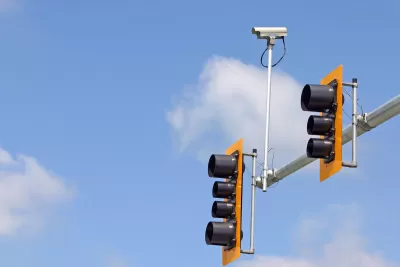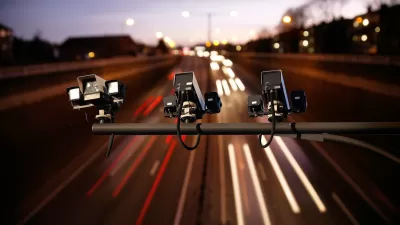Residents are wary of the new technology’s potential for surveillance, but support boosting enforcement while reducing interaction with police.

A new report outlines the opinions expressed by Boston community members in a series of focus groups that sought to understand how Black residents view the city’s road safety and traffic enforcement policies. Writing in Streetsblog Massachusetts, Christian MilNeil outlines the report’s findings.
Researcher Lindiwe Rennert, the study’s author, “found widespread agreement that the current system is not working well, particularly in Black communities, which face higher crash risks both from police violence and from dangerous roads.” But residents also expressed concern over violent interactions with law enforcement.
“The big takeaway was, cameras don’t have guns.” According to Rennert, “While there are civil liberties concerns associated with camera-based enforcement, the concern is de-escalated from loss of life, to an abuse of information. Both are important, but the scale is unquestionably different.” But participants also said new technology could set up new methods of surveillance and perpetuate discriminatory systems.
Based on the focus groups, Rennert makes some suggestions to lawmakers to implement successful automated enforcement programs: ensure fine revenues are directed to street safety and public transit, establish external oversight, limit how much cameras can see, use trusted agencies, and “right-size the penalty” to prevent outsized punishment for minor infractions.
FULL STORY: ‘Cameras Don’t Have Guns’ – Boston’s Black Community Weighs In On Camera-Based Traffic Enforcement

Trump Administration Could Effectively End Housing Voucher Program
Federal officials are eyeing major cuts to the Section 8 program that helps millions of low-income households pay rent.

Planetizen Federal Action Tracker
A weekly monitor of how Trump’s orders and actions are impacting planners and planning in America.

Ken Jennings Launches Transit Web Series
The Jeopardy champ wants you to ride public transit.

Washington Legislature Passes Rent Increase Cap
A bill that caps rent increases at 7 percent plus inflation is headed to the governor’s desk.

From Planning to Action: How LA County Is Rethinking Climate Resilience
Chief Sustainability Officer Rita Kampalath outlines the County’s shift from planning to implementation in its climate resilience efforts, emphasizing cross-departmental coordination, updated recovery strategies, and the need for flexible funding.

New Mexico Aging Department Commits to Helping Seniors Age ‘In Place’ and ‘Autonomously’ in New Draft Plan
As New Mexico’s population of seniors continues to grow, the state’s aging department is proposing expanded initiatives to help seniors maintain their autonomy while also supporting family caregivers.
Urban Design for Planners 1: Software Tools
This six-course series explores essential urban design concepts using open source software and equips planners with the tools they need to participate fully in the urban design process.
Planning for Universal Design
Learn the tools for implementing Universal Design in planning regulations.
Heyer Gruel & Associates PA
Ada County Highway District
Institute for Housing and Urban Development Studies (IHS)
City of Grandview
Harvard GSD Executive Education
Toledo-Lucas County Plan Commissions
Salt Lake City
NYU Wagner Graduate School of Public Service





























